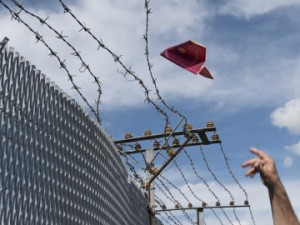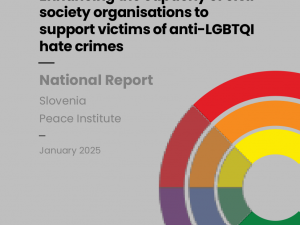Maja Ladić, PhD
Researcher
In order to achieve a more even and equitable distribution of goods, capital, or food, development policies and strategies are not enough. It is necessary to ensure policy coherence in all areas that have any influence on the development field or the development of “developing countries”.
– Maja Ladić on development policies
Since 2011 Maja Ladić has been employed at the Peace Institute where she leads various research and action projects in the fields of human rights, migration, asylum, gender equality, global learning and development cooperation. In 2009, as a student volunteer, she travelled to Rwanda, where she conducted the analysis of needs of women in the local environment of Nyamirambo in Kigali. Based on this analysis, further projects were planned which focused on the gender equality, women’s rights, empowerment and education of women. Maja travelled to Rwanda nine times since 2009 and spent more than seven months there. Working on the mentioned projects, continuous return to the same environment and a good social network in Rwanda contributed to the decision for doctoral studies and enabled the implementation of her field research. In 2020 she successfully defended her PhD dissertation The inclusion of gender dimension in the development strategies of developing countries: The case of Rwanda. She is the author and co-author of several scientific and professional articles, mainly on the topics covered in her doctoral dissertation and topics related to migration, refugees and human rights. In last years she organized several public events, lectures or workshops in schools and faculties.
Featured project
-

RefugeeAction II: Advocacy for inclusive asylum and migration policies, Integration of refugees, Education and Awareness-raising on migration causes for general public
To contribute to a more open and just society in which refugees would feel welcome and accepted as equal members of the society.
Projects
- Unforgotten: Advocating for the Rights of the Erased
- Enhancing the capacity of civil society organisations to support victims of anti-LGBTQI+ hate crimes (ENACT)
- Policy coherence for (sustainable) development – assesment of the effects of Slovenian national policies on developing countries and on the sustainable development of the Republic of Slovenia
- EU Charter of Fundamental rights: Awareness raising and Instruments to promote a culture of Rights (FAIR)
- Research network FRANET
- City for Everybody – Building Responsible Action for Inclusive Local Communities (CIFER)
- JUSTICE FOR ALL: Enhancing the Rights of Defendants and Detainees with Intellectual and/or Psychosocial Disabilities: EU Cross-Border Transfers, Detention and Alternatives
- Counter-hate: Improving the assistance of victims of hate crimes through a victim-centred and intersectional approach
- Complementary Pathways in South-East Europe (COMP4SEE)
- MIPEX – The Migrant Integration Policy Index
- Human Rights Guide
- Sustainable. Local. Global.
- WANNE – We all need new engagement
- Education and economic empowerment of vulnerable groups of women in Rwanda
- GEAR: Global Education and Active Response for the Protection of Human Rights, Inclusion and Democratic Values in Intercultural Societies
- Developing bystander responses to sexual harassment among young people
- RefugeeAction II: Advocacy for inclusive asylum and migration policies, Integration of refugees, Education and Awareness-raising on migration causes for general public
- NGO consortium: With global learning to global goals!
- Workshops on hate speech and migrations
- National Integration Evaluation Mechanism (NIEM). Measuring and improving integration of beneficiaries of international protection
- RefugeeAction: Monitoring of Refugee Policies, Provision of Information and Tackling Xenophobia
- Obtaining Political Equality by New Names – OPENN
- Knowledge Pays (Off): With Education and (Economic) Empowerment of Women Towards Gender Equality in Rwanda
- The Erased: Towards Justice and Accountability
- Mapping of Stateless Persons in Slovenia
- Nyamirambo Women’s Center – Women for Women
- CoMiDe – Consistency of Migration and Development Policy
- Cross-Border Experience: The Interfaces of the EU and the SEE Countries Enhancing a Successful Enlargement Process
- NWC sustainability – socioeconomic engagement and poverty reduction in local community Nyamirambo in Kigali
- The Erased: Remedying Human Rights Violations
- Empowering Nyamirambo Women’s Center
Featured publication
-

National Report on Anti-LGBTIQ+ Hate Crime in Slovenia Released
The report underscores the importance of recognizing and addressing all forms of anti-LGBTIQ+ harm to better support affected communities.
Publications
- National Report on Anti-LGBTIQ+ Hate Crime in Slovenia Released
- Report / Building Responsible Action for Inclusive Local Communities, National report – Slovenia
- Report / National report on hate crime in Slovenia
- Third National Report on Slovenia’s implementation of different areas of integration policy for beneficiaries of international protection
- Second National Report on Slovenia on the implementation of integration policy towards beneficiaries of international protection
- Report on the evaluation of the integration of beneficiaries of international protection, Slovenia 2016
- Razor-Wired. Reflections on Migrant Movements through Slovenia in 2015
